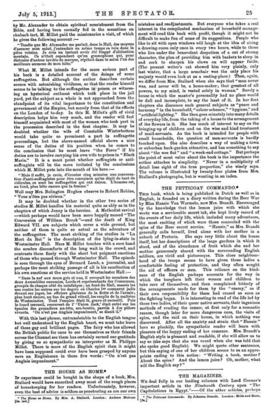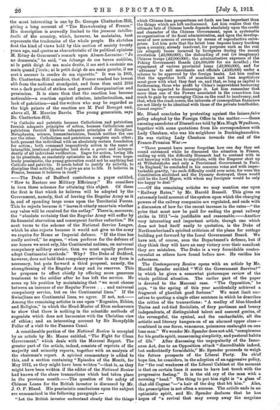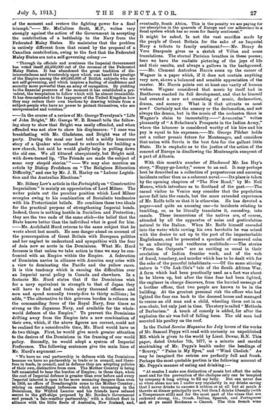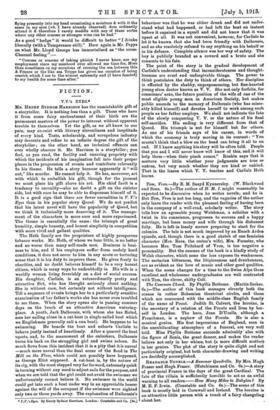THE MAGAZINES.
WE deal fully in our leading columns with Lord Cromer's important article in the Nineteenth Century upon " The Capitulations in Egypt."—Of the other articles, perhaps
• The Petticoat Commando. By Johanna Brandt. London: Mills and Boon. reg.]
the most interesting is one by Dr. Georges Chatterton-Hill, giving a long account of " The Reawakening of France." His description is avowedly limited to the jeunesse intellec- tuella of the country, which, however, he maintains, best
represents the tendencies of the whole people. He sketches first the kind of views held by this section of society twenty years ago, and quotes as characteristic of its political opinions M. Remy de Gourmont's remark upon Alsace-Lorraine : " Je ne donnerais," he said, " en echange de ces terres oubliees, ni le petit doigt de ma main droite, it me sert ii soutenir ma main quand j'ecris ; ni le petit doigt de ma main gauche, it me sea h secouer la cendre de ma cigarette." It was in 1905, Dr. Chatterton-Hill considers, that France reached her lowest ebb from the national standpoint, and from then until 1910 was a dark period of strikes and general disorganization and pessimism. It is since then that the reaction has become noticeable—a reaction against atheism, intellectualism, and lack of patriotism—and the writers who may be regarded as the high priests of the reaction are M. Paul Bourget and, above all, M. Maurice Barres. The young generation, says Dr. Chatterton-Hill,
"is Catholic and patriotic because Catholicism and patriotism furnish adequate principles of action, because Catholicism and patriotism furnish likewise adequate principles of discipline. Metaphysics, science, humanitarianism, furnish neither the one nor the other. Catholicism and patriotism complete each other; both present the individual with an absolutely certain foundation for action ; both command imperatively action in the name of intangible, irrational principles laid down a priori and indepen- dently of all individual verification. Eager for action, loving life in its plenitude, as resolutely optimistic as its elders were hope- lessly pessimistic, the young generation could not be anything but Catholic and patriotic. It needs belief to justify its activity, to discipline that activity, and to give an aim to life. It believes in France, because it believes in itself."
—The Duke of Bedford contributes a paper entitled, " How to Restore our Military Efficiency." He considers in turn three schemes for attaining this object. Of these the first is that which he believes will be adopted by the
Government, namely, that of leaving the Regular Army as it is, and of spending large sums upon the Territorial Forces. This he rejects because it " leaves it utterly uncertain whether any value will be received for the outlay." There is, moreover, the "absolute certainty that the Regular Army will suffer by its financial starvation and consequent further reduction." He next turns to the scheme of the National Service League, which he also rejects because it would not give us the army we require for Home or Imperial defence. "If the time has really arrived," he argues, " when perforce for the defence of our homes we must rely, like Continental nations, on universal compulsory military service, then we must equally perforce adopt Continental methods." Why ? The Duke of Bedford, however, does not hold that compulsory service in any form is necessary, but puts forward a third proposal, namely, the strengthening of the Regular Army and its reserves. This he proposes to effect chiefly by offering more generous treatment to the soldier after he has left the service. He sums up his position by maintaining that " we must choose between an increase of our Regular Forces . . . and universal compulsory service, but on the Continental lines." If the Swiss:lines are Continental lines, we agree. If not, not. Among the remaining articles is one upon " Eugenics, Ethics, and Religion," in which the Head-Master of Eton endeavours to show that there is nothing in the scientific methods of eugenists which does not harmonize with the Christian view of ethics ; and an interesting account by Sir Bampfylde Fuller of a visit to the Panama Canal.
A considerable portion of the National Review is occupied by an article by Mr. Maxse entitled, " The Fight for Clean Government," which deals with the Marconi Report. The
greater part of the article, indeed, consists of reprints of the majority and minority reports, together with an analysis of the chairman's report. A spirited commentary is added to this, and a section containing "Episodes of the Month, for May 1912, as they might have been written "—that is, as they
might have been written if the editor of the National Review
bad known of the share transactions which had taken place in the previous month.—The question of the safety of Chinese Loans for the British investor is discussed by Mr.
J. 0. P. Bland. His pessimistic conclusions upon the subject are summarized in the following paragraph :— "Let the British investor understand clearly that the things which Chinese loan prospectuses set forth are less important than the things which are left undiscussed. Let him realize that the ultimate fate of Chinese bonds depends absolutely upon the credit and character of the Chinese Government, upon a systematio re-organization of its fiscal administration, and upon the develop- ment of new sources of revenue by means of reproductive enter- prises. Let him note that the latest loan imposes heavy burdens upon a country, already insolvent, for purposes such as the real (or alleged) losses incurred by foreigners during the recent revolution (X2,000,000); the disbanding of real (or imaginary) Chinese troops (£3,000,000); the administrative expenses of the Peking Government Boards (.£4,000,000 for six months) ; the repayment of various provincial loans (.£2,900,000), and for `advances' to salt merchants and officials (4500,000) under a scheme to be approved by the foreign banks. Let him realize that the appetites both of mandarins and loan negotiators must grow with what they feed on, and that, so long as capital is forthcoming, those who profit by China's improvident borrowing cannot bo expected to discourage it. Let him remember that more than one of the Powers associated in the consortium has much to gain by encouraging China on the road to insolvency, and that, when the crash comes, the interests of cosmopolitan financiers are not likely to be identical with those of the private bondholder. Caveat emptor."
Mr. Bland concludes by protesting against the laissez-faire
policy adopted by the Foreign Office in the matter.—Some amusing anecdotes of Disraeli are told by Mrs. Hugh Wyndham, together with some quotations from his correspondence with Lady Chesham, who was his neighbour in Buckinghamshire. He was visiting Lady Chesham towards the end of the Franco-Prussian War
Those present have never forgotten how one day they sat round entranced while he discussed the situation in France, ending up with the difficulty Bismarck had to contend with in not knowing with whom to negotiate, with the Emperor shut up at Willielmshohe and only a Provisional Government in Paris. `In England,' he concluded in his sonorous voice and with imper- turbable gravity, `no such difficulty could ever arise, for were the Constitution abolished and the Dynasty destroyed, there would still be the Lord Mayor, with whom any foreigner would be only too happy to deal.'"
—Of the remaining articles we may mention one upon "Railway Rates," by Mr. Harold Russell. This gives an extremely lucid account of the system upon which the charging powers of the railway companies are regulated, and ends with a discussion of how far the recent increase in the rates—" the price that must now be paid for ending the great railway strike in 1911 "—is justifiable and reasonable.—Another very interesting and important article, though one which does not lend itself easily to quotation, is the Duke of Northumberland's spirited criticism of the plans for cottage building put forward by the Local Government Board. We have not, of course, seen the Department's defence, but if they think they will have an easy victory over their assailant they are mistaken. The Duke is a very formidable contro- versalist as others have found before now. He verifies his references.
The Contemporary Review opens with an article by Mr.
Harold Spender entitled " Will the Government Survive?" in which he gives a somewhat picturesque review of the whole political situation. The earlier part of the paper is devoted to the Marconi case. " The Opposition," he says, " in the spring of this year accidentally achieved a fragment of ghoulish good fortune." We must limit our- selves to quoting a single other sentence in which he describes the critics of the transactions : "A medley of blue-blooded Tories and red-tied Socialists, of fiery partisans and breezy independents, of distinguished talent and assured genius, of the revengeful, the cynical, and the uncharitable, all the artistic and literary hangers-on of an alarmed upper class— combined in one fierce, venomous, poisonous onslaught on one lone man." We wonder Mr. Spender does not add, "conspicuous for his gentle spirit, unassuming simplicity, and pastoral habits of life." After discussing the unpopularity of the Insur- ance Act, due to an Opposition attack " discreditable indeed, but undoubtedly formidable," Mr. Spender proceeds to weigh the future prospects of the Liberal Party. Its chief hope lies, he considers, in the adoption of an aggressive policy, for " the real weakness of the Liberal Cabinet at the moment is that on certain lines it seems to have lost touch with the
progressive feeling." It is the old cry of the man with a morning "head." The thing to put him right is "a glass of
that old Cognac "—"a hair of the dog that bit him." Alas, the prescription is not often a success. The article ends iu an optimistic spirit, and Mr. Spender declares that he has hopes of "a revival that may sweep away the megrims of the moment and restore the fighting power for a final triumph."— Mr. McCallum Scott, M.P., writes very strongly against the action of the Government in accepting the contribution of a battleship to the Navy from the Federated Malay States. He maintains that the problem is entirely different from that raised by the proposal of a Canadian contribution, owing to the fact that the Federated Malay States are not a self-governing colony :—
"Through its officials and nominees the Imperial Government has voted itself 42,250,000 out of the revenue of the Federated Malay States. It has abandoned the great tradition of dis- interestedness and trusteeship upon which was based the prestige of the Empire among the 400,000,000 of British subjects who are not self-governing, and which inspires a feeling of confidence and security more powerful than an army of occupation. By yielding to the financial pressure of the moment it has established a pre- .edent, the temptation to follow which will be almost irresistible. It has demonstrated to the taxpayers of the United Kingdom how they may reduce their own burdens by drawing tribute from a subject-people who have no power to protect themselves, who are unrepresented and voteless."
—In the course of a review of Mr. George Trevelyan's " Life of John Bright," Mr. George W. E. Russell tells the follow- ing story to show that Bright was easily offended, and when offended was not slow to show his displeasure: " I once was breakfasting with Mr. Gladstone, and Bright was of the
party. During the meal our host told a mildly humorous story of a Quaker who refused to subscribe for building a new church, but said he would gladly help in pulling down the old one. We all tittered obsequiously, but Bright said, with down-turned lip, `The Friends are made the subject of some very stoopid stories."' — We may also mention an article by Bishop Frodsbam on " The Religious Education Difficulty," and one by Mr. J. H. Harley on " Labour Legisla- tion and the Australian Elections."
Mr. Sidney Low's article in the Fortnightly on " Constructive
Imperialism " is mainly an appreciation of Lord Milner. The writer points out the peculiar position which Lord Milner occupies owing to his combination of Socialistic tendencies with his Protectionist beliefs. He combines these two ideals for the practical purpose of strengthening Imperial bonds. Indeed, there is nothing hostile in Socialism and Protection;
they are the two ends of the same stick—the belief that the State knows better than the individual what is good for him.
—Mr. Archibald Hurd returns to the same subject that he wrote about last month. He sees danger ahead on account of the preoccupation of Great Britain with European politics and her neglect to understand and sympathize with the fear of Asia now so acute in the Dominions. What Mr. Hurd foresees is that unless we take action in time we may be con- fronted with an Empire within the Empire. A federation of Dominion navies in alliance with America may arise with a view to dominating the Pacific and the yellow races.
It is this tendency which is causing the difficulties over an Imperial naval policy in Canada and elsewhere. In a footnote Mr. Hurd states that if the Dominions wish for a navy equivalent in strength to that of Japan they
will have to find and train sixty thousand officers and men and spend annually twenty-five to thirty millions ; he
adds, " The alternative to this grievous burden is reliance on the commanding force of the Royal Navy, four times as strong as the Japanese Navy, and available for the whole- world defence of the Empire." To prevent the Dominions drifting away from the Empire into a new combination of their own, which, if the above figures are correct, could not be realized for a considerable time, Mr. Hurd would have us do two things. First, he would give much greater attention to the desires of the Dominions in the framing of our world policy. Secondly, he would adopt a system of Imperial Preference. The following sentences give the main lines of Mr. Hurd's argument :-
" We have no real partnership in defence with the Dominions because we have no partnership in trade or in council, and there- fore in trade, in council, and in defence they are adopting policies of their own, distinctive from ours. The Mother Country is being left unassisted to bear the burden of Empire ; in these days, when the cost of Imperial defence is greater than ever before and every Imperial interest is open to far more menacing dangers than even in 1909, no offers of Dreadnoughts come to the Mother Country ; relying on centrifugal influences which are increasing in the Dominions, Sir Wilfrid Laurier and his friends have refused assent to the gift-ships proposed by Mr. Borden's Government and preach `a fair-weather partnership,' with a distinct fleet in alliance with the little fleets of Australia, New Zealand, and,
eventually, South Africa. This is the penalty we are paying for our absorption in the quarrels of Europe and our adherence to a fiscal system which has no room for family sentiment."
It might be asked, Is not the vast sacrifice made by the people of Great Britain for the sake of an Imperial Navy a tribute to family sentiment?—Mr. Henry de Vere Stacpoole gives us a sketch of Villon and some translations. The eternal Parisian breathes in these poems; here we have the realistic picturing of the joys of life and their results, and always a gallows in the background.
Mr. Clement Antrobus Harris sums up the career of Wagner in a paper which, if it does not contain anything very new, shows a balanced and sensible appreciation of the master. Mr. Harris points out at least one vanity of human wishes. Wagner considered that music by itself had in Beethoven reached its full development, and that he himself bad created a new art consisting of music, declamation, drama, and scenery. What is it that attracts us most
now Certainly not the scenery or the declamation, and not always the drama, but in the music of the orchestra there is
Wagner's claim to immortality.—" Avunculus " writes pleasantly of " A Subaltern's Prospects in the Indian Army," where the labourer is considered worthy of his hire and his pay is equal to his expenses.—Mr. George Pilcher holds out a rather prosaic future for Montenegro, and considers that union with Servia is the best fate for the gallant little State. He is emphatic as to the justice of the action of the concert of Europe in disallowing the Montenegrin conquest of a part of Albania.
With this month's number of Blackwood Mr. Ian Hay's story, " Happy-go-Lucky," comes to an end. It may perhaps best be described as a collection of preposterous and amusing
incidents rather than as a coherent novel.—Its place is taken by the opening chapters of "The New Road," by Mr. Neil Munro, which introduce us to Scotland of the past.—The casual visitor to Venice may consider that the population never fall into the canals, but the more extended experience
of Mr. Rolfe tells us that it is otherwise. He has devoted a paper—and quite an amusing one—to incidents relating to tumbling, or, as he literally translates it, cascading, into canals. These immersions of the natives are, of course, attended by all the apparatus of noise and gesticulation natural to the Italian. When Mr. Rolfe himself cascaded into the water while rowing his own barchetta he was seized
with the desire to act up to the part of the imperturbable Englishman, and he presented a spectacle of unmoved calm to an admiring and vociferous multitude.—The stories "From the Outposts" are as exciting as usual in their revelation of Indian frontier work, and of the web of fraud, treachery, and murder which has to be dealt with for the sake of the peaceful inhabitants.—Of the same stirring nature is " Ole Luk-Oie's" tale of the South African War.
A farm which had been practically used as a fort was about to be blown up, but after the time fuse had been lighted, the engineer in charge discovers, from the hurried message of a brother officer, that two people are known to be in the building. At the greatest personal risk the officer who had lighted the fuse ran back to the doomed house and managed to rescue an old man and a child, wheeling them out in an arm-chair, but only just in time. The story is called " Methods of Barbarism." A touch of comedy is added, for after the explosion the air was full of falling hens. The old man had secreted his poultry on the roof.
In the United Service Magazine for July lovers of the works of Mr. Samuel Pepys will read with curiosity an unpublished MS. which is given to the world by Lieut. Dewar, R.N. This paper, dated October 7th, 1677, is a minute and careful stocktaking of Mr. Pepys's health under the headings of
" Scurvy," " Paine in My Eyes," and " Wind Cholick." As may be imagined the entries are perfectly full and frank.
Perhaps the most quotable portion is the following account of Mr. Pepys's manner of eating and drinking:
"At meales I make noe distinction of meats but affect the salte most and for the prevention of the cholique only can be tempted by company & long sitting to fill my belly. But can never doe so when alone nor am I under any regularity in my drinks saving that I never drinke to excess° & seldom or at all but at meals & thereto at dinner principally now, but then I drinke liberally (with a Temperance still) and for the most part of the wines that are reckoned strong, viz., Greek, Italian, Spanish, and Portuguese and at ye small Bordeaux =-. Clarret. The thin french wine
flying presently into my head occasioning a moisture & with it the same in my eyes (wh. I have already observed) does ordinarily attend it & therefore I rarely meddle with any of these sortes where any other coarser or stronger wine can be had."
As a good " hedge " it would be difficult to better "I drinke liberally (with a Temperance still)." Here again is Mr. Pepys on what Mr. Lloyd George has immortalized as " the cross- Channel feeling":—
"Courses or seasons of taking phisick I never knew, nor my employment since my manhood ever allowed me time for, More than sometimes on my occasions of crossing tho sea between this & France or the like sea Trippe has given me occasion of being seasick which I am to the utmost extremity and (I have fancied) to my health for some time after."





















































 Previous page
Previous page